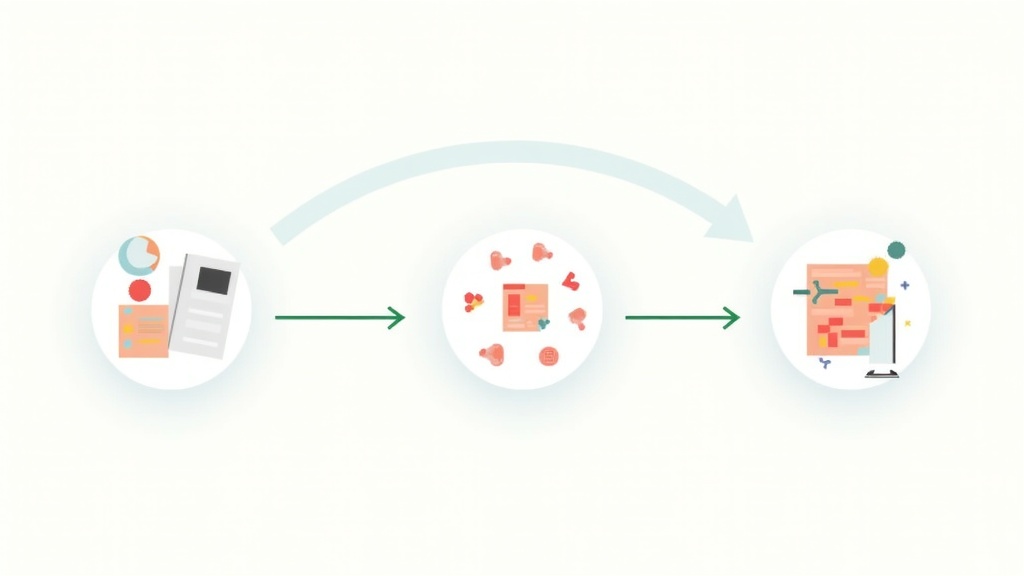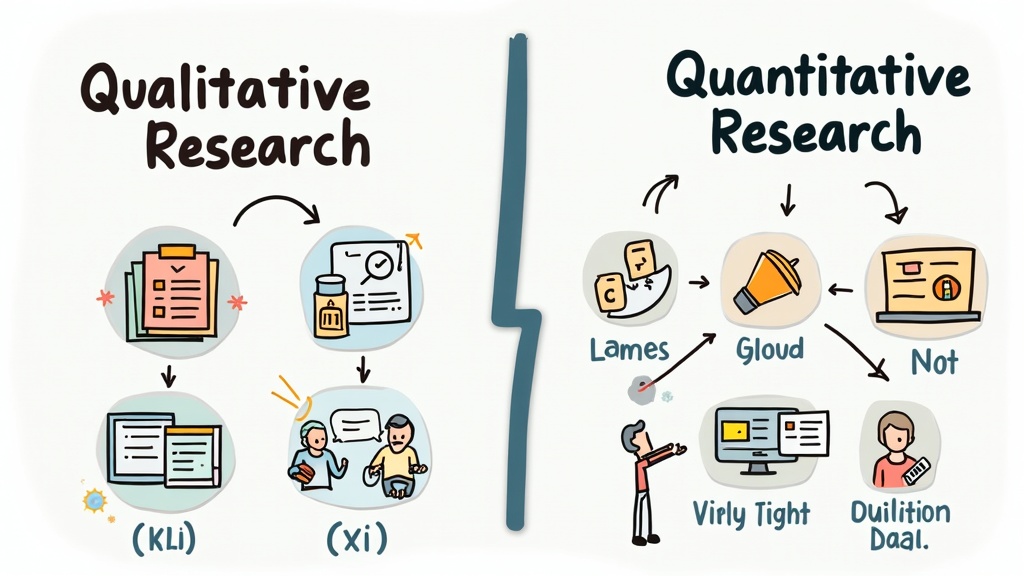Qualitative Research Methods - Complete Guide
Master qualitative research with this guide to interviews, focus groups, ethnography, and analysis. Learn when to use each method and how to generate actionable insights.
12 min read
Agent Interviews
Updated: 2025-11-13
Introduction
Qualitative research is how you find out what people really think, feel, and do.

If you've ever wondered why customers choose one product over another, how employees actually experience company culture, or what drives someone's decision-making process, you need qualitative research. Numbers tell you what's happening. Qualitative work tells you why.
This guide is for researchers, product managers, marketers, and anyone who needs to understand human behavior at a deeper level. You'll learn the core methods, when to use them, and how to avoid the common mistakes that waste time and money. Whether you're exploring a new market, testing a product concept, or trying to understand complex user behaviors, the right qualitative approach gives you insights that surveys and analytics can't touch.
The power here is in depth, not breadth. You're not trying to survey 10,000 people. You're talking to 20 people in a way that reveals things even they didn't know about themselves.
What is Qualitative Research
Qualitative research is an approach to understanding human behavior, experiences, and social phenomena through non-numerical data. Instead of measuring "how many" or "how much," qualitative methods explore "how" and "why"—the meanings, contexts, and underlying reasons behind human actions.
The approach relies on words, observations, and detailed descriptions rather than numbers and statistics. You're gathering rich, contextual information that reveals complexity, nuance, and the messy reality of human experience.
What Makes Qualitative Research Different
Qualitative research doesn't count things. It understands them.
While quantitative methods measure "how many" and "how much," qualitative approaches explore "how" and "why." You're trying to grasp context, meaning, and the messy reality of human experience that doesn't fit neatly into survey checkboxes.
Here's what that means practically. Instead of asking 500 people to rate their satisfaction on a 1-10 scale, you talk to 15 people about what satisfaction means to them. You hear the stories behind their choices. You notice the hesitation when they discuss certain topics. You see patterns emerge that your survey questions never would've captured because you didn't know to ask about them.
The research is flexible by design. When something interesting comes up, you follow it. That's not a bug, it's a feature. You're discovering what matters rather than confirming what you already suspected.
Context is everything. Someone's answer changes based on where they are, who's around, what happened that day, and a thousand other factors. Qualitative research captures those nuances. It accepts that humans are complex and that understanding them requires patience, skill, and methods designed for depth.
Core Qualitative Research Methods
Interviews
One-on-one conversations remain the most flexible and widely-used qualitative technique. You're sitting down with someone (virtually or in person) and having a guided conversation about your research topic.
The beauty of interviews is their adaptability. You can go deep on topics that matter, skip things that don't, and adjust your questions based on what you're learning. Good interviewers create space for people to share honestly while staying focused on research objectives.
Semi-structured interviews hit the sweet spot—you have key questions but aren't locked into rigid scripts. Structured interviews follow set questions when you need consistency. Unstructured interviews work like natural conversations, perfect for exploratory work where you're still figuring out what questions to ask.
Most qualitative studies need 12-20 interviews to identify major patterns, though complex topics require more. Learn more about interview methodologies →

Focus Groups
Get 6-10 people in a room and watch what happens when they discuss your topic together. That's the magic of focus groups—people build on each other's ideas, challenge assumptions, and reveal social dynamics you'd never see in individual interviews.
Focus groups excel at exploring social norms, group decision-making, and how people influence each other. They're great for testing concepts, understanding shared experiences, and generating ideas. The group dynamic creates energy and reveals things participants wouldn't mention one-on-one.
But they're not always the right choice. Sensitive topics? Individual interviews work better. Need unfiltered individual perspectives? Skip the group setting where conformity pressures emerge.
Online focus groups have expanded what's possible, enabling real-time collaboration across geography without travel costs.

Ethnography
Ethnography means observing people in their natural environment. You're watching what they actually do rather than relying on what they say they do. There's often a gap between the two.
This method came from anthropology but it's incredibly practical for business research. Want to understand how doctors actually use a medical device during surgery? Be there. Trying to figure out how families make grocery decisions? Go shopping with them.
The insights come from seeing context, workarounds, unspoken habits, and environmental factors that shape behavior. Digital ethnography extends this to online communities, social media, and digital interactions.
It's time-intensive and requires skilled observers who can spot patterns without imposing their interpretations. But when you need authentic behavioral data, nothing else comes close. See the Ethnography section above for more details.

Case Study Research
Case studies dive deep into specific instances—an organization, an event, a product launch, a customer's journey. You're creating a rich, detailed picture of what happened and why it matters.
The approach combines multiple data sources: interviews, documents, observations, and artifacts. This triangulation creates a fuller understanding than any single method provides. Case studies work well for understanding success patterns, analyzing failures, and exploring unique situations that offer insights for similar contexts.
They're particularly valuable when you need to understand complexity, when context matters enormously, or when you're trying to learn from exceptional examples.
Content Analysis
Sometimes the data already exists—in documents, social media posts, customer reviews, support tickets, or organizational communications. Content analysis systematically examines these materials to identify patterns, themes, and meanings.
You're looking at both what's explicitly said (manifest content) and what's implied (latent content). Modern content analysis often uses text analytics to process large volumes while maintaining qualitative depth.
This method works great for understanding how people talk about topics naturally, tracking how conversations evolve over time, or analyzing existing materials without creating new data collection burden.

Grounded Theory
Grounded theory builds explanatory frameworks directly from data rather than testing predetermined theories. You're letting patterns emerge and developing models that explain what you're seeing.
It's iterative—collect data, analyze it, collect more data based on what you learned, analyze that, and keep going until new data doesn't reveal new insights. This approach works brilliantly for understanding processes, exploring new phenomena, or developing theoretical frameworks.
The method requires discipline and systematic analysis but produces theories grounded in real-world data rather than academic speculation.

Phenomenology
Phenomenology explores lived experiences. What's it actually like to go through cancer treatment? How does it feel to use your product for the first time? What's the experience of starting a new job?
You're after the essence of experiences from participants' perspectives. It requires careful attention to your own assumptions so you don't project your interpretations onto their experiences.
This approach shines for understanding customer experiences, user interactions, and personal responses to products, services, or events.
Narrative Analysis
People think in stories. Narrative analysis examines how people construct and share their stories to make sense of experiences.
You're looking at story structure, what gets emphasized or omitted, how people position themselves, and what meaning they're creating through storytelling. It's powerful for understanding identity, sense-making, and how people communicate their experiences.

Thematic Analysis
Thematic analysis is probably the most common analysis approach—you're identifying, analyzing, and reporting patterns (themes) across your qualitative data.
It's flexible enough to work with different methods and theoretical frameworks. You read through data, code it, identify patterns, and develop themes that capture important aspects of your research questions.
The approach balances systematic analysis with creative interpretation, making it accessible while still producing rigorous insights. Learn more about thematic analysis →
Research Quality and Credibility
Good qualitative research isn't about sample size. It's about credibility, transferability, dependability, and confirmability.
Credibility means your findings accurately represent what participants said and experienced. You achieve this through prolonged engagement, persistent observation, and techniques like member checking where participants validate your interpretations.
Transferability is about providing enough context that readers can judge whether findings apply to their situations. You do this through thick description—rich detail about your context, participants, and methodology. Learn more about transferability →
Dependability means consistent, documented processes. Keep detailed records of decisions, maintain clear audit trails, and document how your thinking evolved.
Confirmability demonstrates that findings come from data rather than researcher bias. This is where triangulation methods help—using multiple data sources, methods, or analysts to validate findings.
Reflexivity
Reflexivity requires acknowledging your own perspective and how it shapes the research. You're not trying to eliminate bias (impossible), you're making it visible and accounting for it.
Reflexive researchers examine their assumptions, backgrounds, and positions that influence how they interpret data. This self-awareness improves research quality by making researcher influence transparent rather than pretending it doesn't exist.
Specialized Methods Worth Knowing
Data Analysis
Qualitative data analysis turns raw data into insights. You're coding transcripts, identifying patterns, developing themes, and building interpretations that answer research questions.
Modern qualitative data analysis often uses software to manage large volumes of data while maintaining analytical depth. But technology supports analysis, it doesn't replace thinking.
Research Design
Solid research design aligns methods with objectives. You're making intentional decisions about who to study, how to collect data, and how to analyze it.
Good design considers practical constraints—timeline, budget, access—while maintaining methodological rigor. The best designs often combine multiple methods for richer insights.
Software Tools
Specialized software helps manage and analyze qualitative data. Tools like NVivo, Atlas.ti, and Dedoose handle coding, team collaboration, and pattern identification.
Qualitative research software accelerates analysis and maintains organization but doesn't replace analytical thinking. Learn more about research tools →

Qualitative vs Quantitative Research
It's not either/or. They answer different questions and complement each other.
Quantitative research tests hypotheses through statistical analysis. It measures things across large samples and gives you numerical precision about "how many" and "how much."
Qualitative research generates hypotheses through exploration. It understands meaning, context, and complexity in smaller samples and tells you "how" and "why."
Many researchers combine approaches through mixed methods—using qualitative work to understand what matters, then quantifying it at scale. Or using quantitative data to identify patterns, then qualitative work to understand what drives them.
Market Research Applications
Qualitative market research explores customer motivations, tests concepts, and understands decision-making in business contexts.
You're uncovering unmet needs, validating product ideas, understanding brand perceptions, and exploring how people make purchase decisions. This work directly informs product development, marketing strategies, and business decisions.
It's particularly valuable when entering new markets, developing innovations, or trying to understand why customers choose competitors.
Different Types of Qualitative Research
Beyond the core methods, qualitative research includes participatory action research (where participants are co-researchers), historical analysis, discourse analysis, and visual methods.
Each approach serves specific purposes and theoretical perspectives. Learn more about types of qualitative research →
Examples in Practice
Real qualitative research examples help illustrate the methods in action. Patient experience studies in healthcare, user research for product development, organizational culture assessments, and consumer behavior studies all rely on qualitative approaches.
See qualitative research examples →
Services and Support
Many organizations partner with qualitative research specialists who bring methodological expertise, industry knowledge, and capacity that internal teams lack.
Professional qualitative research services handle everything from study design through analysis and reporting, providing objectivity and specialized skills.
Getting Started with Qualitative Research
Start with clear objectives. What do you need to understand? Why does it matter? What decisions will the research inform?
Choose methods based on what you're exploring. Sensitive topics need individual interviews. Social dynamics need focus groups. Authentic behavior needs observation.
Plan adequate samples—usually 12-20 interviews or 3-6 focus groups for most topics, though complex research requires more. You're looking for saturation, where new conversations don't reveal new patterns.
Practice good interviewing. Ask open-ended questions. Listen more than you talk. Follow interesting threads. Create comfortable spaces where people share honestly.
Record and transcribe carefully. You can't analyze what you didn't capture. Modern transcription tools make this easier but accuracy matters.
Analyze systematically. Develop coding schemes, identify patterns, build themes, and validate findings. Software helps manage the process but analytical thinking remains essential.
Get Started with Agent Interviews
Agent Interviews brings AI-powered efficiency to qualitative research without sacrificing depth or authenticity. Our platform handles recruitment, conducts intelligent interviews, generates transcripts, and identifies patterns—accelerating timelines while maintaining research quality.
You get the insights of traditional qualitative research with the speed and scale of modern technology. Whether you're validating product ideas, understanding customers, or exploring new markets, Agent Interviews delivers actionable insights when you need them.
